Non-Alcoholic Fatty Liver Disease (NAFLD) affects over one third the United States’ population, and its primary cause is obesity. When 5% or more of the liver’s total composition is fat, it can be classified as fatty liver disease. The most prevalent causes of liver disease are considered obesity, poor nutrition, sedentary lifestyle, as well as diabetes.
The first step that individuals at risk of developing, or currently suffering, from fatty liver disease can do to improve liver health is improve their nutrition. A healthy diet will naturally cause weight loss and reduce liver fat in individuals who are overweight.
Unfortunately, there is a great deal of confusion over the efficacy of different diets for weight loss. Americans are plagued with conflicting information about low-carb, low-fat, high-protein, all liquid diets, and even grapefruit diets as the secret key that they need to finally shed those extra pounds.
According to the dietary recommendations for patients with fatty liver disease, carbohydrates should comprise around 40-50% of total nutrient intake*. Too many carbs can lead to fatty liver disease, while a low-carb diet can help reduce liver fat. A carb-restricted diet may improve liver fat metabolism, decrease inflammation, improve weight loss, and balance blood sugar.
A low-carb diet is one of the most popular choices for individuals trying to lose weight. However, while a low-carb diet may assist in initial weight loss, it is ultimately not regarded as a healthy or sustainable diet. It’s classified as fad diet because of its quick-fix guarantee of weight loss, using one simple method.
A majority of weight loss from beginning a low-carb diet can be attributed to water weight. Carbohydrates that are not immediately converted into energy are normally stored as glucose. Every gram of glycogen carries 3 grams of water. So when you switch to a low-carb diet, you lose glycogen and subsequently also lose water that your body normally carries.
While this quick weight loss may seem appealing, you are not losing fat or getting healthier, and as soon as you begin consuming a balanced ratio of carbohydrates again, your body will put on water weight again. Maintaining a low level of glycogen can also cause liver damage.
There are healthy and unhealthy high-carbohydrate foods. A low-carb diet could be successful long-term if high fat, high sugar, or high salt carbohydrate foods such as French fries, donuts, and pizza are eliminated. However, this is not really a low-carb diet as much as simply a healthy diet.
Carbohydrates would not be responsible for the weight loss, but the damaging factors associated with these particular carbohydrates.
Many fruits, vegetables and whole wheat products could be classified as high in carbohydrates. However, as they are potent sources of fiber, vitamins & minerals, fruit and vegetables are extremely healthy diet choices.
| Hamburger | Donut | Banana | Whole Wheat Bread | |
|---|---|---|---|---|
| Carbs (g) | 50 | 50 | 50 | 50 |
| Calories (kcal) | 647 | 329 | 195 | 295 |
| Fiber (g) | 3.5 | 1.5 | 5.7 | 7.0 |
| Salt (mg) | 1452 | 286 | 2 | 532 |
| Sugar (g) | 12.31 | 34.32 | 26.77 | 5.08 |
Source: USDA
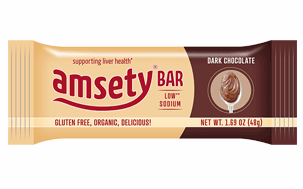
Discover the first nutrition bars designed to support liver health.
Read more >You don’t need to obsess over your carb count to lose weight. In fact, this could even harm your weight loss efforts. Instead, focus on choosing natural, unprocessed foods. Try to replace simple carbs with complex carbs rich in dietary fiber. Unlike simple carbs which are just sugars, complex carbs contain more fiber, vitamins, and minerals. They may help you fight a liver disease, feel full longer and provide energy. Complex carbs can be found in nuts, quinoa, or brown rice. Maximize your fruit and vegetable consumption and avoid fast food and junk food.
Amsety has developed the first nutrition bar to support liver health, making it a perfect choice for a liver-healthy diet. Buy our Amsety bars here >
*Kargulewicz A, Stankowiak-Kulpa H, Grzymisławski M. Dietary recommendations for patients with nonalcoholic fatty liver disease. Prz Gastroenterol. 2014;9(1):18–23. doi:10.5114/pg.2014.40845.
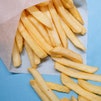
6 Diet Tips to Lower Cholesterol
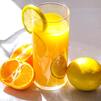
4 Beverage Tips for a Healthy Liver

Vegan Diet For Weight Loss
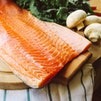
How Can Fatty Acids Benefit Your Liver?
What´s your Liver Health Score?
Find out whether you are leading a livery-health lifestyle
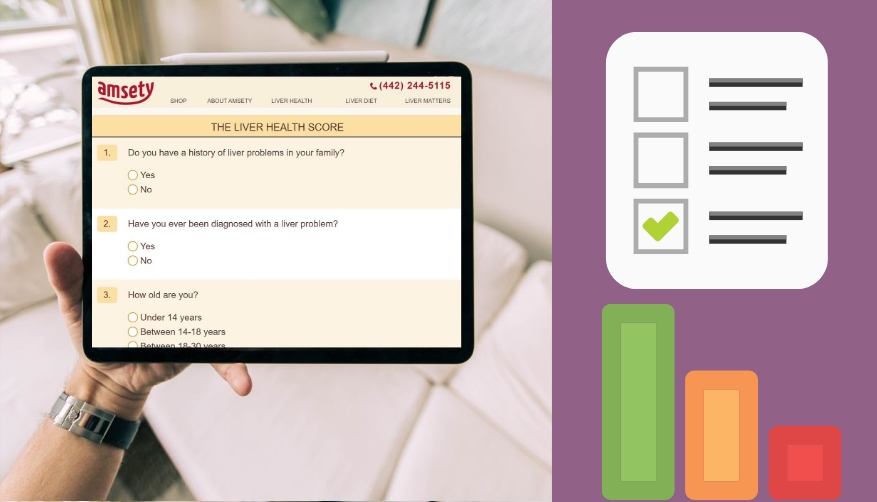
Related Subjects
Back to top